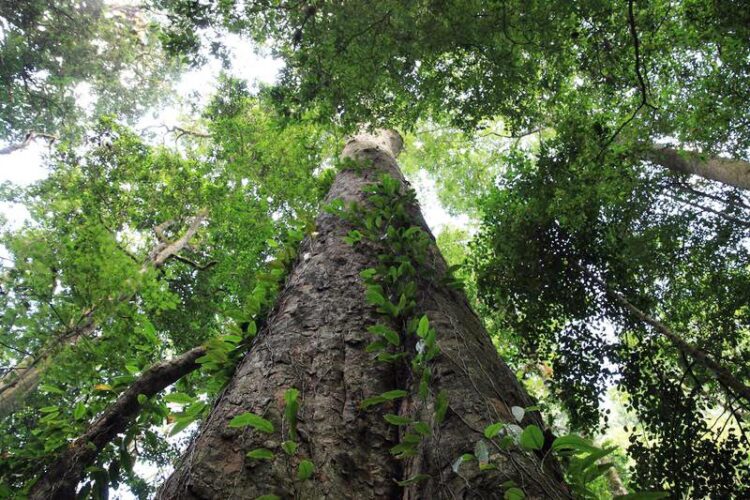Significant carbon storage in African mountain forests

Giant tree of the species Entandrophragma excelsum at Kilimanjaro.
Photo: (c) Andreas Hemp
New study in “Nature”…
The tropical mountain forests of Africa store more carbon per hectare in their above-ground biomass than all other tropical forests on earth. With this great storage capacity, which was previously estimated by the Intergovernmental Panel on Climate Change (IPCC) to be considerably lower, they have made a major contribution to climate protection.
This is the conclusion of a study published in Nature by an international network of researchers who are urging for the preservation of these carbon-rich ecosystems. Dr. Andreas Hemp from the University of Bayreuth and his team investigated carbon stocks in the mountain forests of Kilimanjaro.
The researchers involved in the study examined carbon storage in the above-ground biomass of mountain forests on 226 selected plots spread over 44 regions in 12 African countries. The results showed that Africa’s tropical mountain forests store an average of 149.4 tonnes of carbon per hectare. The IPCC, on the other hand, had previously only assumed an average of 89.3 tonnes of carbon per hectare. The average storage capacity of the above-ground biomass of tropical forests in Central and South America and the Caribbean, as determined in earlier research, is considerably lower than that of tropical montane forests in Africa.
“Especially in East Africa, most forests are located in mountainous regions, so they are of crucial importance here for the carbon cycle and climate protection. Our study, which has quantified this storage capacity for the first time, makes clear the ecological damage that further clearing of mountain forests would cause. And conversely, it also shows the benefits of the reforestation measures supported by many African states. Based on previous research, it has been established that African mountain forests are biodiversity hotspots and are home to a large number of endemic plant and animal species, i.e. species that do not exist anywhere else on earth. This insight alone confirms that efforts to preserve these resources should be intensified,” says Dr Andreas Hemp.
Together with partners in Germany, Kenya, and Tanzania, the Bayreuth biologist has been researching the flora on Mount Kilimanjaro for more than 30 years. As part of the joint project “Kili-SES” funded by the German Research Foundation (DFG), he is investigating the change in vegetation on Mount Kilimanjaro and the climatic, economic, and social causes involved. For the study, which has now been published in Nature, he carried out, together with his research team, systematic measurements in mountain forests on Mount Kilimanjaro: “If you know the height, circumference, and wood density of the tree trunks, you can determine the amount of carbon stored in the trees with some accuracy on the basis of these measurements,” explains Hemp.
Due to the rarity of destructive cyclones in Africa, the comparatively high carbon stocks of African tropical forests are based not least on the high storage capacity of very large trees, which can grow undisturbed in both mountain and lowland regions. The tallest trees in Africa are found on Mount Kilimanjaro, as a research group led by Dr. Andreas Hemp discovered in 2016.
Wissenschaftliche Ansprechpartner:
PD Dr. Andreas Hemp
Plant Systematics
Phone: +49 (0) 921 / 55-2464 or +49 (0)9246 / 980979
E-mail: andreas.hemp@uni-bayreuth.de
Originalpublikation:
Aida Cuni-Sanchez et al.: High aboveground carbon stock of African tropical montane forests. Nature (2021). DOI: https://doi.org/10.1038/s41586-021-03728-4
Media Contact
All latest news from the category: Ecology, The Environment and Conservation
This complex theme deals primarily with interactions between organisms and the environmental factors that impact them, but to a greater extent between individual inanimate environmental factors.
innovations-report offers informative reports and articles on topics such as climate protection, landscape conservation, ecological systems, wildlife and nature parks and ecosystem efficiency and balance.
Newest articles

Properties of new materials for microchips
… can now be measured well. Reseachers of Delft University of Technology demonstrated measuring performance properties of ultrathin silicon membranes. Making ever smaller and more powerful chips requires new ultrathin…

Floating solar’s potential
… to support sustainable development by addressing climate, water, and energy goals holistically. A new study published this week in Nature Energy raises the potential for floating solar photovoltaics (FPV)…

Skyrmions move at record speeds
… a step towards the computing of the future. An international research team led by scientists from the CNRS1 has discovered that the magnetic nanobubbles2 known as skyrmions can be…





















